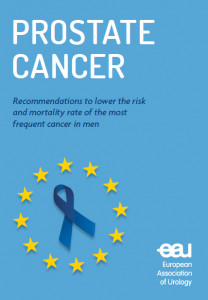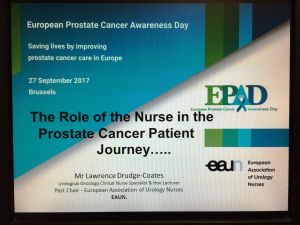European Parliament meeting examines Prostate Cancer White Paper
Last September 27 saw the EAUN took its rightful place at the European Parliament to discuss the implications of the Prostate Cancer White Paper during this year’s European Prostate Cancer Awareness Day (EPAD).
Together with Europa Uomo and the European Cancer Patient Coalition (ECPC), the European Association of Urology (EAU) organised the event to discuss White Paper recommendations on how to lower the risks and improve the management and care of prostate cancer patients. The White Paper was launched in January 2017.In his opening remarks Mr. Vytenis Andriukaitis, EU Commissioner for Health and Food Safety, stated: “A better understanding and knowledge of health risks and how to manage them are crucial. Preventing and controlling prostate cancer- and cancer in general- is of key concern to the European Commission.” He also underlined the importance of raising awareness for a healthy lifestyle and the need to further look into the opportunities of personalised healthcare as recommended in the Prostate Cancer White Paper. Andriukaitis invited all participants to share this valuable resource with the EU Health Policy Platform to ensure that it reaches all stakeholders.
Two Members of European Parliament (MEPs), Mrs. Marian Harkin and Mr. Alojz Peterle who are both committed to the joint mission, chaired the event. Awareness of prostate cancer was a key theme throughout the forum. The discussions also took up the crucial need to collaborate in raising public awareness particularly on issues or perceptions such as viewing prostate cancer as ‘an old man’s disease.’ Also taken up were equity with regards access to health care education and addressing issues related to language and culture. Both Francesco de Lorenzo of the European Cancer Patient Coalition (ECPC) and Mr. Ken Mastris of Europa Uomo delivered the key message which was the inability of patients to tackle these aforementioned issues on their own, Thus, unity is essential amongst the key stakeholders for them to act as one and drive their goals forward. Moreover, there is the expectation for the EU to do more. EAU Secretary General Prof. Chris Chapple Secretary General also reiterated the need for collaboration.
Disease prevention and screening
Other key issues were education, disease prevention and data gathering and interpretation with regards the issue of screening. The discussion on screening raised controversial views on over-treatment and that screening would ultimately lead to identifying more insignificant PCa tumours. Regarding treatment, better differentiation between low and high-risk prostate cancers was viewed as crucial in preventing over-treatment. Related to this was the important role of modern diagnostic imaging techniques.
The economics of PCa was also examined such as rising costs, impact of increased survival and equitable treatment access to care across the EU, particularly in low-income countries, which remains a key issue for the EU. Ian Banks of the European Men’s Health Forum also commented on workforce economics and noted that in fact there is economic benefit in getting men back to work after treatment.
In discussing the role of treatment and support of PCa patients, the author commented: “Treatment just involves a small part of the patient’s journey… there is a pivotal role that is being and can be played by non-medical professionals closer to the patient. Nurses play a pivotal role in providing holistic care, and that we should no longer talk about a multidisciplinary team, but about a multi-professional one.”
“We should no longer talk about a multidisciplinary team, but about a multi-professional one.”
 In his presentation the author outlined the impact of the nurse in the prostate cancer journey and the key role of the nurse, as part of a multi-professional approach to care. The presentation addressed the effects of prostate cancer and the significant impact on quality of life, and that PCa adversely affects every aspect of a man’s well-being, and far beyond treatment, thus requiring a more holistic approach. With more than 417,000 men diagnosed with PCa the author stressed the need for “A patient centered and focused approach that is multi-professional.” Urgent attention is also needed to look at strategic workforce planning to address the growing financial pressure to deliver timely and effective healthcare.
In his presentation the author outlined the impact of the nurse in the prostate cancer journey and the key role of the nurse, as part of a multi-professional approach to care. The presentation addressed the effects of prostate cancer and the significant impact on quality of life, and that PCa adversely affects every aspect of a man’s well-being, and far beyond treatment, thus requiring a more holistic approach. With more than 417,000 men diagnosed with PCa the author stressed the need for “A patient centered and focused approach that is multi-professional.” Urgent attention is also needed to look at strategic workforce planning to address the growing financial pressure to deliver timely and effective healthcare.
Primary care was one of the specific areas highlighted in this discussion, which is defined by the WHO as the “first contact” for individuals with cancer. The need for continued, comprehensive and coordinated care was also raised but which is hampered by significant inequalities in terms of access and infrastructure. The author also stated during the forum that “Cancer and its consequences would be an increasingly prominent part of the primary care workload in the future, with the breadth of health care professionals needing to expand, such as community nurses to meet this demand,” as outlined in a recent ECCO position statement.
With regards addressing quality of care and economics, the author added that ”nurses had shown beyond any doubt that they can deliver timely, cost and clinically effective patient care which positively improves patient outcomes.” However, there are prejudices or perceptions on nursing roles that have to be put aside. To think outside the box and consider the benefits that developing and enhancing these roles would bring are important. The author, European Association of Urology Nurses however, noted the existing inequalities in nursing education and training which needs to be addressed by public regulators such as the EU. The author concluded his presentation with a quote from Ernest Hemingway: “It is good to have an end to journey toward, but it is the journey that matters in the end.”
At end of the meeting, Prof. Hein Van Poppel, EPAD co-organiser and on behalf of the EAU, emphasized that all parties present needed support from the European Parliament and the European Commission, but most importantly from patients.
Download the EAU White Paper here:
EAU White Paper “Prostate Cancer“
Mr. Lawrence Drudge-Coates, Past Chair EAUN, London (UK), l.drudge-coates@eaun.org

